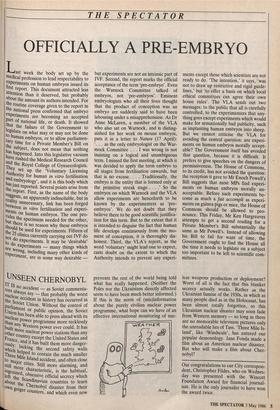UNSEEN CHERNOBYL IT Is n o tors always say accident —
as Soviet commenta- - that probably the worst nuclear accident in history has occurred in the Soviet Union. Without the control of Parliament or public opinion, the Soviet Union has been able to press ahead with its nuclear power programme more recklessly than any Western power ever could. It has built more nuclear power stations than any Other country except the United States and France, and it has built them more danger- ously: lacking the second safety walls Which helped to contain the much smaller Three Mile Island accident, and often close to major cities. Still more alarming, and still more characteristic, is the habitual, Ingrained, obsessive official secrecy which left the Scandinavian countries to learn about the Chernobyl disaster from their ciwn geiger counters, and which even now prevents the rest of the world being told what has really happened. (Neither the Poles nor the Ukrainians directly affected seem to have been much better informed.) If this is the norm of (mis)information about the purely civilian nuclear power programme, what hope can we have of an effective international monitoring of nuc- lear weapons production or deployment? Worst of all is the fact that this blanket secrecy actually works. Rather as the Ukrainian famine of the 1930s, in which as many people died as in the Holocaust, has been almost totally forgotten, so this Ukrainian nuclear disaster may soon fade from Western memory — so long as there are no memorable television pictures only the unreadable lies of Tass. `Three Mile Is- land', like Vindscale', has entered our popular demonology. Jane Fonda made a film about an American nuclear disaster. But who will make a film about Cher- nobyl?


















































 Previous page
Previous page